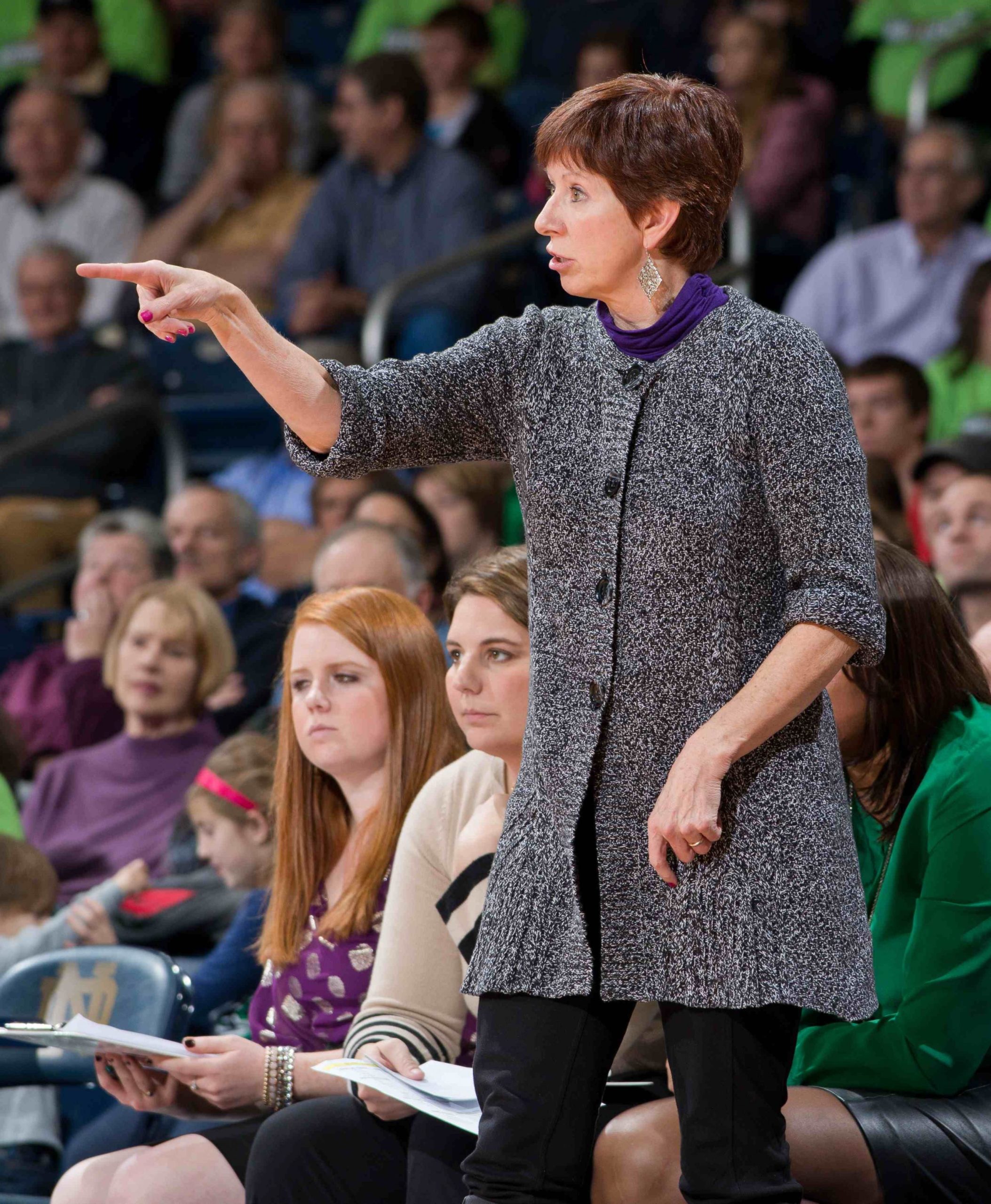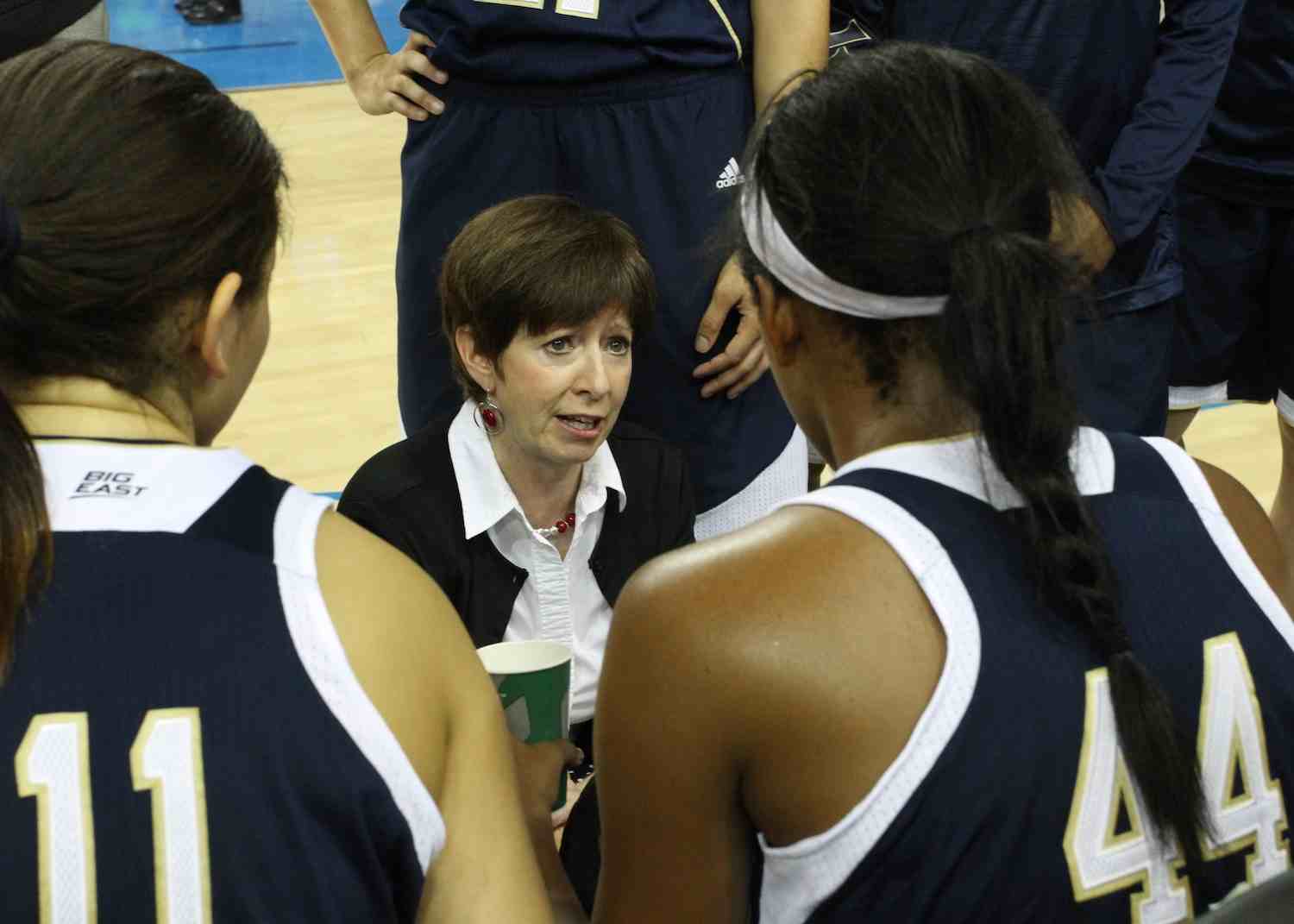Fear the Irish: Muffet McGraw talks Notre Dame hoops
Consistency is difficult to master at the collegiate level. There’s the natural turnover from graduation, and student-athletes today are transferring at a rate greater than ever before. Coaches pursue new opportunities, and mounting injuries can take their toll on an otherwise successful season.

Through the first three months of the season, Notre Dame is a perfect 19-0, ranked second behind UConn. It isn’t unreasonable to call the Fighting Irish a favorite to appear in Nashville at this year’s Final Four. McGraw has led her team there on five occasions, including each of the last three seasons.
That type of consistency commonly eludes college coaches, but McGraw’s formula works. It’s comprised of talent, cooperation and, most of all, chemistry.
“I want people that fit well together and are a good fit for Notre Dame, McGraw said. When you bring people to campus, you have an idea. I would say I’m very slow to offer scholarships as opposed to a lot of other coaches because I want to get to know somebody before I make an offer. I want them to visit campus and meet the team because the team is very important to me, and I want people who are going to fit well with what we have.”
Creating a winner
Expectations are high for McGraw’s program, but that wasn’t always the case. Before she arrived in 1987, women’s basketball was an undeveloped program living in the shadow of football and men’s basketball. That was something McGraw intended to change.
McGraw was just 31 years old when she received an offer to come to Notre Dame. It was a significant turning point in her young career, but not one she would have anticipated years earlier. McGraw, who was a sociology major at St. Joseph’s University in Philadelphia, never considered coaching as a potential career choice. All she wanted was to find some way to stay involved with the game she loved.
“There weren’t a lot of opportunities back then, and coaching was really about the only chance you had to stay in the game, said McGraw, who accepted her first coaching job at Archbishop Carroll High School (Radnor, Pa.). I was looking for a job in the sociology field, but I decided to take that job at a local high school. From my first day of practice, I knew I had found my passion.”
McGraw then spent five seasons at nearby Lehigh University before she received a call from Notre Dame. It was significant turning point in her career, and McGraw admits she was so excited after being offered the job that she forgot to ask about the salary.
“When I got off the phone, my husband asked how much they were paying and I said I didn’t know, McGraw said. I was just so thrilled to get the job that I probably would have done it for free. It was like a dream come true, and I’ll still have that pinch-me moment when I walk across campus.”
Since that time, McGraw has evolved into one of the most accomplished coaches in Division I basketball, winning one national title and multiple coach of the year honors while compiling more than 700 career victories. Her new crop of recruits seem poised to help Notre Dame continue its dominance of the Big East, perhaps positioning the team for another national championship.
Climb to the top
Like most successful coaches, McGraw had a number of role models throughout her career that helped her fine tune her own philosophy. Jim Foster, a member of the Women’s Basketball Hall of Fame who coached at St. Joseph’s, is among McGraw’s long-time mentors. She also looks to Digger Phelps, former Notre Dame men’s coach and college basketball analyst at ESPN. Phelps occasionally visits practice and provides McGraw with guidance on the Xs and Os.
Regardless of the level or amount of success a coach has enjoyed, each one can point to at least one person in their career that has helped them flourish. Phelps is honored to have played such an important role in McGraw’s career, but he’s not surprised by what she’s done. McGraw was an ambitious coach eager to learn when she first arrived at Notre Dame, and Phelps said her willingness to always improve and make adjustments is what keeps her at the top.

“She got to the Final Four and won a title and I didn’t do that, so I’ll trade spots with her anytime, Phelps joked.
“What impresses me most about her is she’s a real person that always comes across sincere and honest. She has the personality and silent charisma, but she’s also a great recruiter, and when she gets some talent, she knows what to do with it.”
McGraw has certainly had her share of talent over the years, and Notre Dame consistently ranks among the best recruiting classes in the nation. But it’s not just about impressing the top athletes. McGraw needs her team to click, so she’s not quick to offer a scholarship to someone she doesn’t see fitting into her system.
That’s especially important in the college game, where players come and go on a regular basis. Athletes need to have passion and a high basketball IQ, and for McGraw, few have been better than Skylar Diggins.
Diggins, who plays in the WNBA for the Tulsa Shock, was a consummate leader for the Fighting Irish. Her mastery on the court was equaled by her effort off of it, where she would participate in staff meetings and offer her thoughts on upcoming games. McGraw encouraged Diggins and others to do the same during games, allowing her to gain perspective on what they were seeing on the court.
“To give the players that chance to really have a say was a big part of our success, and when you have someone with an IQ like that, you really want to take advantage of it, McGraw said. Diggins would regularly watch film of a game and comment on certain screens or other tendencies she would pick up on.
“We’ve have a lot of players like that, mostly point guards. They’ve all been really smart, and we have another player like that now with Lindsay Allen. But Skylar was really special.”
Phelps agreed player feedback is an asset every coach should take advantage of. During his 20-year career at Notre Dame, that type of collaboration was a regular occurrence in his program. It even helped him knock off seven No. 1-ranked opponents, tying an NCAA record.
“You want them to become coaches on the floor, especially if you’re making adjustments during the game, Phelps said.
Breaking barriers
McGraw was in high school when Title IX was signed into law. At that time, there were 3.9 million high school student-athletes across the nation — 3.6 million of which were boys, according to the National Federation of State High School Associations.
McGraw insists that it wasn’t difficult to maintain her passion in a sport that was dominated by males. There were no scholarships, and she had to buy her own shoes when she played basketball in college. But she loved the game, and that was enough for her to stay involved despite all the obstacles.
“It was different, but it was great, she said. We were definitely pioneers. We were blazing the trail, and it’s fun to look back now and see that we opened up a lot of doors for women today.”
McGraw admits she would still like to see a lot of those doors open for women coaches. Her program carries a remarkable graduation rate, and that culture has helped create women qualified for any job in college sports. She believes women just need to be more confident.
“That’s why we’re trying to teach our women to be strong, independent women and go into the job market and make the difference that they know they can, McGraw said. I think when jobs are open you find more men applying because women aren’t as confident, and I would love to see that change.”
McGraw’s success as a basketball coach at one of the nation’s top colleges may help do just that. Those who have worked closely with McGraw over the years describe her as a role model, and her leadership may encourage young women to pursue more coaching jobs. It certainly doesn’t hurt that McGraw, along with others like Pat Summitt and Tara VanDerveer, have had a tremendous amount of success over a long period of time.
That’s no small accomplishment, especially considering how the Fighting Irish were relatively unknown in the women’s basketball scene before McGraw arrived in South Bend. She still recalls her first trip to campus, admiring the golden dome and being inspired by school’s tradition. It was always her goal to elevate her program to the same level as Notre Dame’s other sports, and by all accounts, she has succeeded.
“I’ve always admired what she’s done, and I’m proud of what she’s done, Phelps said. She’s really made Notre Dame one of the top four programs in the country.”








